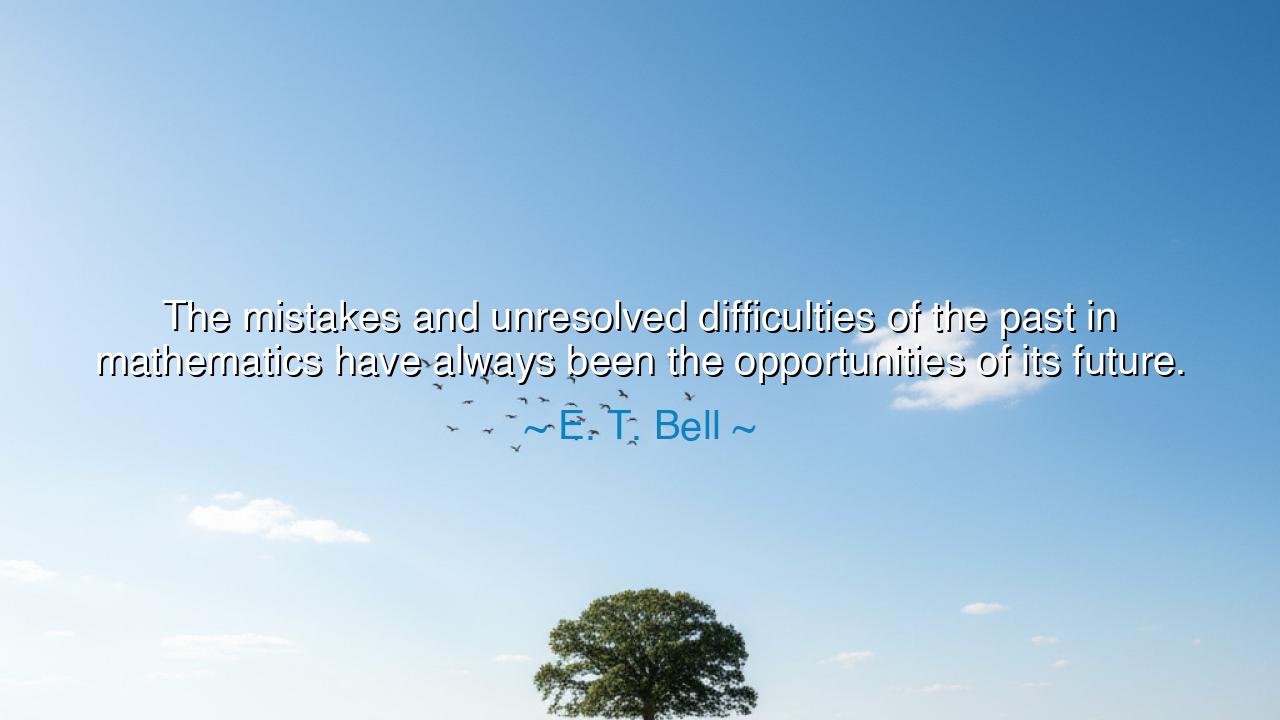
The mistakes and unresolved difficulties of the past in
The mistakes and unresolved difficulties of the past in mathematics have always been the opportunities of its future.






In the realm of mathematics, as in all fields of human endeavor, there is a truth that transcends time: the very mistakes and difficulties that appear insurmountable in the present are often the seeds of future breakthroughs. E. T. Bell, in his reflection, "The mistakes and unresolved difficulties of the past in mathematics have always been the opportunities of its future," speaks to a profound reality—that failure, confusion, and challenges are not endpoints, but gateways to greater understanding. The errors we encounter are not to be feared or ignored, but embraced as opportunities for growth and discovery.
The ancient Greeks understood the value of failure and inquiry in the pursuit of knowledge. Socrates, the great philosopher, would often put his ideas to the test in open dialogue, allowing his thinking to be challenged, corrected, and refined. He knew that true wisdom did not lie in the answers one already possessed, but in the relentless search for truth—even through mistakes. Similarly, the Pythagoreans, with their quest to understand the relationship between numbers and the natural world, often found that their initial theories led to new questions, and it was through their mistakes that they refined their approach to mathematics, eventually uncovering fundamental truths that would shape the course of the discipline.
In the world of mathematics, one of the most profound examples of mistakes becoming opportunities is the story of Isaac Newton and his work on calculus. When Newton first began to grapple with the rate of change and the problem of motion, the difficulties he encountered seemed insurmountable. The very idea of understanding how objects move through time and space challenged the mathematical framework of his day. But Newton, rather than turning away from the difficulties, pressed on, and it was through his struggle with these very challenges that he developed calculus, an entirely new branch of mathematics. His mistakes and struggles led not only to personal growth but to a mathematical revolution that would shape centuries of scientific thought. Bell’s words echo this: mathematics thrives on its unresolved difficulties, turning them into the opportunities of the future.
Consider the example of Carl Friedrich Gauss, who, as a young boy, was tasked with summing the numbers from 1 to 100. The problem seemed simple enough, yet for many, it would have taken a considerable amount of time to add each number individually. However, young Gauss, noticing a pattern, quickly solved the problem by pairing numbers in a way that simplified the process. This was a mistake that many might have overlooked—an error in traditional thinking—but for Gauss, it was an opportunity to see the world of numbers in an entirely new light. This simple insight led to a lifetime of mathematical achievements, and Gauss is now remembered as one of the greatest mathematicians in history. In the same way, the mistakes and complexities of mathematics have always served as stepping stones to deeper insights.
The lesson embedded in Bell’s words is one of resilience and perseverance. In the face of adversity, failure does not signify the end but marks the beginning of a new phase of learning. Mathematics, like all fields of study, is built on trial and error—the mistakes of today become the triumphs of tomorrow. Just as Socrates embraced questioning as the means to discover deeper truths, we must be willing to question our own assumptions, make mistakes, and learn from them. In this way, we honor the legacy of those who came before us and contribute to the unfolding story of human knowledge.
In practical terms, this means that we must approach challenges with the understanding that difficulties are not obstacles, but opportunities for growth. Whether in mathematics, science, or life, we must not fear failure but embrace it as a necessary part of our journey. The unresolved problems of today—whether in equations or in life’s struggles—are the questions that will lead to the solutions of tomorrow. By viewing our mistakes through the lens of opportunity, we unlock the potential within ourselves to innovate, discover, and create.
Ultimately, Bell’s reflection is a reminder to cherish the process of learning. It is easy to become discouraged when faced with difficulty or failure, but the true power of the human spirit lies in our ability to rise again, to take the lessons from our struggles, and to move forward with greater wisdom. Let us look to the example of the ancients, the mathematicians, and the great thinkers who, despite their failures, created the foundations for the knowledge we now take for granted. The journey is not about avoiding mistakes but embracing them as the opportunities they truly are. And in that pursuit, we will create a future rich with understanding and discovery.






AAdministratorAdministrator
Welcome, honored guests. Please leave a comment, we will respond soon